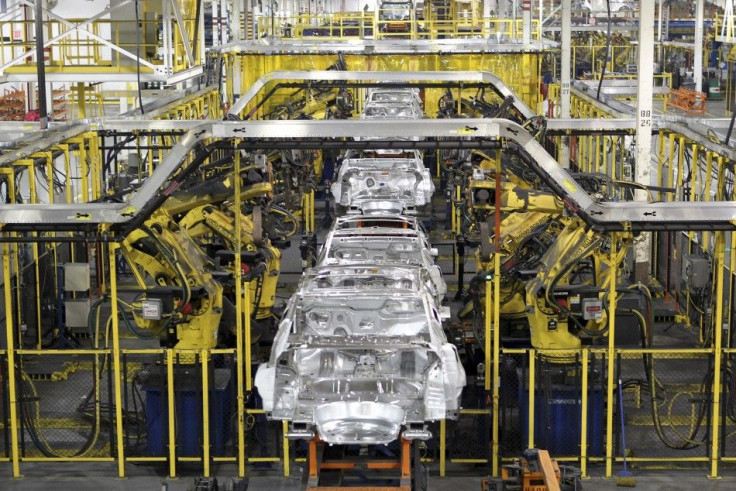Why Has US Manufacturing Productivity Surged This Year: It?s The Software, Stupid!

U.S. manufacturing productivity surged 5.4 percent in the first quarter, the most since last year's third quarter, even as overall productivity eased about 1 percent, the U.S. Department of Labor said.
Why? The probable reason is enterprise software and other technology tools that make U.S. products easier to design, produce and scrutinize than ever before. Even as there is a whiff of recession surrounding the technology sector when it comes to hardware, nobody sees a decline in software.
Indeed, the leaders in enterprise software such as Oracle (Nasdaq: ORCL), the No. 1 database developer; International Business Machines Corp. (NYSE: IBM), the No. 2 computer company and SAP AG (NYSE: SAP) all report strong demand for new factory software. New entrants are in the field.
One is General Electric (NYSE: GE), which as a manufacturing conglomerate, has plenty of experience in the field. Another is private Infor, the New York-based company that rolled up many other enterprise software companies and had planned an initial public offering this year.
This is a good way for us to use 'Big Data,' '' said Mary Grow, VP for enterprise technology at JHP Pharmaceuticals, which manufactures sterile injectable products and other health care supplies mainly for hospitals and medical centers.
JHP Pharmaceuticals, with head offices in Parsippany, N.J., runs a 24-hour-a-day factory in Rochester, Mich., that employs 350, including 200 on the production line. Using a computer network based mainly on products from Hewlett-Packard Co. (NYSE: HPQ), Grow runs the entire operation on GE's Proficy software.
Using the technology software has transformed a 100-year-old plant into an ultra-modern drug and health products facility, Grow said. The enterprise software allows JHP workers to assemble injectibles but also eliminate clipboards and paper-based checks required for quality control.
As well, the software is merged with data analytics tools that measures the plant's temperature and atmospheric conditions, all crucial to know while putting together injectable supplies destined to top U.S. medical centers.
The Proficy software also monitors problems, so that there's a record of a stopped batch or the occasional error, so that shift managers at a 24-hour plant are never out of the loop, Grow said.
GE, based in Fairfield, Conn,. is a relative newcomer to the sector, but has already benefited from higher internal productivity: First- quarter operating income rose 1 percent as overall revenue rose 4 percent to $35.2 billion, but manufacturing revenue surged 14 percent.
Similarly, enterprise resource planning (ERP) software deployed throughout Detroit enabled the Big Three carmakers to report surging first-quarter results. Crucially for the U.S. carmakers: American cars are largely free of the defects that caused them to lose market share to Japanese brands a generation ago.
The suppliers of this software -- IBM, Oracle, SAP -- as well as smaller providers of the so-called middleware that wraps around it, have all reported higher quarterly net income, with higher expectations for the year. HP, which announced major charges and 27,000 worker firings, is a special case, as second-quarter net income fell 31 percent to $1.6 billion, or 80 cents a share.
This week, Redwood Shores, Calif.-based Oracle announced it had merged all its products into services that can be delivered by the Internet, or the cloud. CEO Larry Ellison hailed the advance as making his company the only vendor that offers a complete suite of modern, socially enabled applications, all based on a standards-based platform.
Not to be outdone, IBM, HP, SAP, GE and other ERP companies such as Citrix Systems (Nasdaq: CTXS) and BMC Software (NYSE: BMC) are also shifting as much as possible to the cloud. Given that many clients are multinationals, the benefits derived in Rochester, Mich., for JHP could just as easily be replicated in Malaysia or Argentina.
So the prospect is good that worldwide manufacturing will benefit. Indeed, multinationals like Dell Inc. (Nasdaq: DELL), the No. 3 computer maker, have all their factories on a single ERP system. That means workers in Texas, Malaysia, China and Brazil are all using the same productivity software.
Shares of GE rose 12 cents to $19 in Thursday trading, while IBM shares closed at $194.44, up 45 cents and Oracle's at $27.18, down 35 cents.
© Copyright IBTimes 2025. All rights reserved.






















